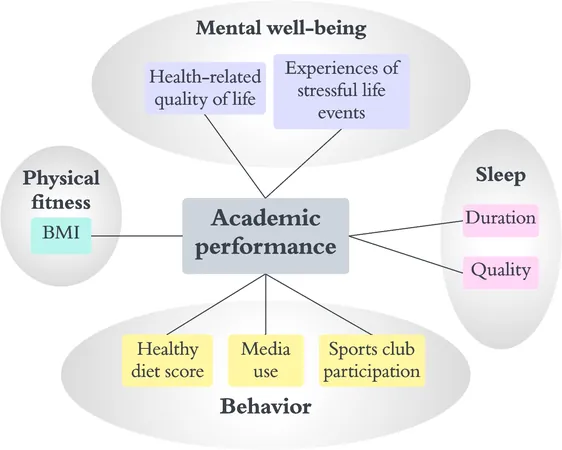
Unlocking Academic Success: How Health Indicators Shape Performance in European Teens
2025-06-26
Author: Wei
Understanding the Link Between Health and Academic Achievement
In the ever-evolving landscape of education, understanding what drives academic performance in adolescents is crucial. A new study sheds light on the intricate web of health indicators—physical, mental, behavioral, and sleep-related—that collectively influence the academic trajectories of European boys and girls.
The Key Findings Revealed from the I.Family Study
The I.Family study, encompassing participants from nine European countries, explores how various health factors relate to academic performance. Chronic health issues, physical fitness, mental well-being, and even the quality of sleep have been shown to significantly impact educational outcomes. Notably, mental health is a strong predictor of academic success, with greater emotional well-being correlating to higher student achievement.
Physical Fitness: A Catalyst for Cognitive Functioning
Research underscores the importance of physical fitness which not only boosts cognitive abilities and attention but also influences how well students perform academically. Engaging in regular physical activity can provide a dual benefit—enhancing health and potentially improving academic performance.
Sleep’s Impact: The Unseen Influence on Learning
Sleep is another crucial factor. Studies reveal that inadequate sleep diminishes cognitive capabilities, leading to poorer academic outcomes. Conversely, consistent and quality sleep is linked to academic success, suggesting that teenagers should prioritize their sleep routines for optimal learning.
Sex Differences: A Layer of Complexity in Academic Performance
The findings also reveal significant differences between boys and girls when it comes to academic performance. Girls tend to outperform boys, particularly in language subjects, yet they often experience higher levels of stress and anxiety. Surprisingly, boys exposed to stressful life events sometimes leverage these challenges, finding success in mathematics as a coping mechanism.
Behavioral Factors: The Role of Media and Activity Levels
Appropriately engaging with media and maintaining an active lifestyle are essential behavioral factors. Reduced media consumption is consistently linked to better academic outcomes, while participation in sports clubs appears to bolster performance in both mathematics and language subjects for both genders.
Nutrition Matters: Diet’s Influence on Academic Achievement
Interestingly, when it comes to diet, girls show a strong correlation between healthy eating and academic success in languages, while boys do not exhibit the same trend. Lower BMI scores among girls also correspond to higher success rates in language subjects, highlighting potential social-emotional development implications linked to obesity.
Moving Forward: A Call for Comprehensive Health & Education Strategies
The I.Family study offers valuable insights into how health indicators collectively shape academic performance, revealing that a multifaceted approach to health—spanning physical, mental, and behavioral aspects—could pave the way for enhanced educational strategies. Efforts to foster well-being among adolescents, integrating physical activity, adequate sleep, and healthy eating habits, may not only improve health but also lead to brighter academic futures.
Conclusion: A Holistic Approach to Adolescent Success
As this research highlights, educational success is deeply intertwined with health. Educational policies and practices that prioritize the health and well-being of students are not just beneficial—they are essential for unlocking the full potential of Europe’s youth.





 Brasil (PT)
Brasil (PT)
 Canada (EN)
Canada (EN)
 Chile (ES)
Chile (ES)
 Česko (CS)
Česko (CS)
 대한민국 (KO)
대한민국 (KO)
 España (ES)
España (ES)
 France (FR)
France (FR)
 Hong Kong (EN)
Hong Kong (EN)
 Italia (IT)
Italia (IT)
 日本 (JA)
日本 (JA)
 Magyarország (HU)
Magyarország (HU)
 Norge (NO)
Norge (NO)
 Polska (PL)
Polska (PL)
 Schweiz (DE)
Schweiz (DE)
 Singapore (EN)
Singapore (EN)
 Sverige (SV)
Sverige (SV)
 Suomi (FI)
Suomi (FI)
 Türkiye (TR)
Türkiye (TR)
 الإمارات العربية المتحدة (AR)
الإمارات العربية المتحدة (AR)